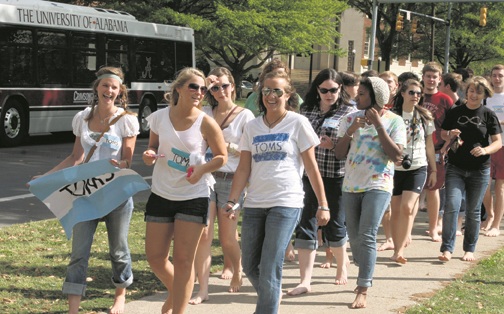As #hardwithoutshoes trended worldwide on Twitter, and with the Facebook statuses of participants as testimonials, owners and fans of TOMS shoes went a day without anything on their feet.
The footwear company markets its shoes based less on style and comfort and more on the fact that, for each pair of shoes bought, the company donates one to a shoeless child somewhere in the world.
Thursday, the company may have had more than one goal — predominately, of course, they sought to raise awareness for a real social issue and the impact a pair of shoes can have on children’s health.
But additionally, on Thursday, TOMS may have been conducting research. To surmise that TOMS wanted to gauge the atmosphere for corporate social activist expansion isn’t a stretch.
In doing so, TOMS perfectly represents the role corporations and consumers alike should strive to fill in the coming years.
The demonstration accomplished more than participants might have realized—knowingly or not, they clearly established a demand for socially aware products that corporations in any industry won’t ignore for long.
As consumers, every person who not only took off their shoes but also posted something about the experience to Facebook, Twitter, or YouTube — three of the biggest and best advertising engines in recent history — did their part. They might have proclaimed the detrimental effects of a worldwide lack of shoes to their friends, but to corporate observers, they screamed for more socially minded products.
Companies like TOMS and even Starbucks, with its Fair Trade-marked coffee selection, have discovered that social activism sells. Each person Thursday who demonstrated their willingness to go an entire day without shoes represents a potential customer.
In this way, as the people composing the market become more willing to pay a little extra for a product with a social-activist edge, corporations will creatively adapt to the changing demand and contribute to the international community in ways they haven’t before.
Ideally, if the market for socially minded products can reach a critical mass of consumers, we can one day declare the era of unaccountable corporate action over.
For example, when the market reaches this point, no matter how much money it would save, a company like Cargill won’t disregard Brazilian environmental law and build a toxically polluting factory upstream from a small Brazilian town with a fragile fishing industry.
It’s socially unjust, and if the market progresses following TOMS’ model, it won’t be profitable.
The vision is idealistic, sure. But the image and model TOMS produces — and maintains, with a high degree of accountability — sets a precedent for free-market solutions to some of the world’s biggest problems.
Is it really that much of stretch to say that if we spend a little more on socially minded products now, we could pay less in taxes one day? If the free market can progress in this way, capitalism will show its best colors.
That alone makes what TOMS does so important. The model of a market that demands products that directly help other people not only silences capitalism’s critics, but also can contribute to a better world. One with a balance between profit and philanthropy.
William J. Tucker is a freshman majoring in international relations. His column runs on Fridays.






